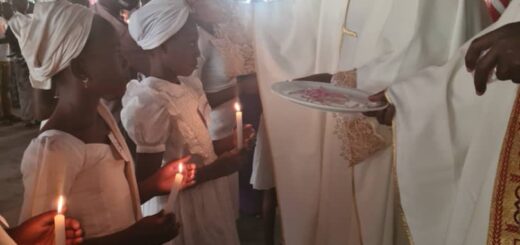The grace of forgiveness
by ARCH BISHOP · September 17, 2023
24th Sunday in Ordinary Time, 17th September, 2023, Our Lady Queen of Nigeria Pro-Cathedral, Abuja. Homily by Archbishop I. A. Kaigama.
Readings: Ecclesiasticus 27:30-28:7; Romans 14:7-9; Matthew 18:21-35
The grace of forgiveness
The readings for this 24th Sunday focus on mercy and forgiveness. They challenge us to imitate Jesus who pronounced forgiveness even from the cross. Forgiveness is an important element of reconciliation and an expression of our Christian belief and desire to live in love, peace, and harmony. No doubt, forgiveness does not take away the hurt or deny the past injury, but it means being willing to overcome the barriers that stand in the way of mending a strained relationship.
In the first reading from Sirach, the author urges his audience to lay aside anger, to grant forgiveness to an offender so that they too could receive forgiveness from God: “Forgive your neighbour the hurt he does to you, and when you pray, your sins will be forgiven.” (Sir. 28:2) Sirach reminds us that forgiving our brothers and sisters is a prerequisite for obtaining the forgiveness of God and having our prayers answered. The author goes further to point out the inevitability of death and to seek to set aside enmity. He reminds us that our earthly existence is like a passing tide; we must never remain enslaved by grudges and revenge. In the words of Lewis B. Smedes, “To forgive is to set a prisoner free and discover that was you.”
We read in the Gospels how Christ offered examples of forgiveness. He forgave Mary Magdalene, the adulterous woman, the paralytic of Capernaum, the thief hanging beside Him on the cross and even His executioners. We are called to emulate Him in love and not be consumed by anger and bitterness. We cannot claim to be true and genuine Christians unless our lives, our every word, actions, and interactions with one another show the kind of love, compassion, and mercy that God Himself has shown us.
It is sad to see some people refusing to forgive those who offend them even when there is a plea for mercy. We hear expressions such as, “over my dead body,” “I can never forget this offense”, etc., I have forgiven but I cannot forget.
In the Nigerian society, made up of adherents of Christianity, Islam, and African Traditional Religion where forgiveness is professed, it is very poorly practised. Some of the recurring communal clashes and violent conflicts in society are not unconnected with bitterness and an unforgiving spirit. While it is understood that there may be good grounds to feel hurt or aggrieved, either because we have been falsely accused, suffered maltreatment and other situations of social injustice, Matthew 5:43-47 says that our refusal to forgive makes us no better than publicans; and in the second reading, St. Paul writing to the Romans tells us to live for Christ and to imitate Him rather than living for ourselves and being consumed by anger, bitterness and violence.
Peter asked a valid question in the Gospel about how often he ought to forgive wrongdoing. According to the rabbinical tradition, forgiveness extends to three offenses and the fourth offence attracts punishment. Peter doubled the number of times for forgiveness as taught by the rabbis and asked if forgiving seven times was okay. Jesus was not impressed and told him that it is not seven but seventy times seven (cf. Mt. 18:22). In Hebrew, the saying “seventy times seven” means the same as “always” (cf. Gen. 4:24). This means we do not attach a number or limit to the times we forgive. We don’t use mathematics or arithmetic in forgiveness, nor do we need a calculator. As God forgives us our heinous crimes and sins, we must learn to always forgive others.
The parable of the two debtors teaches us that we must forgive to be forgiven as we pray in the “Our Father” (cf. Mt. 6:14-15). For St. James, “judgment is without mercy to the one who has shown no mercy” (Jas. 2:13). The merciless behaviour of the debtor in the gospel is both shocking and sad. It is demonstrated nowadays in the gruesome attacks and destruction rooted in ethnic, political, religious bigotry and polemic writings. We need forgiveness in the family, in marital relationships, inter-religious coexistence, friendship, etc. Forgiveness heals and enables us to rise above prejudices to embrace each other in love. We must build a civilization of love only when we realize as the Holy Father, Pope Francis, on April 24, 2019, remarked that “Love attracts love; forgiveness attracts forgiveness.”
Our situation in Nigeria invites us to undergo a change of heart and to learn to forgive genuinely and quickly too as the only way to end political, religious, and ethnic violence which badly retard our effort in building a just and peaceful society devoid of rancour, hatred and strife.
Each of us present here today should promise right now to forgive. Since to err is human and to forgive is divine, use the divine power in you to forgive your bishop, parish priest, fellow parishioners, husband, wife, children, friends, fellow workers, etc. Let forgiveness be your song today and always.




